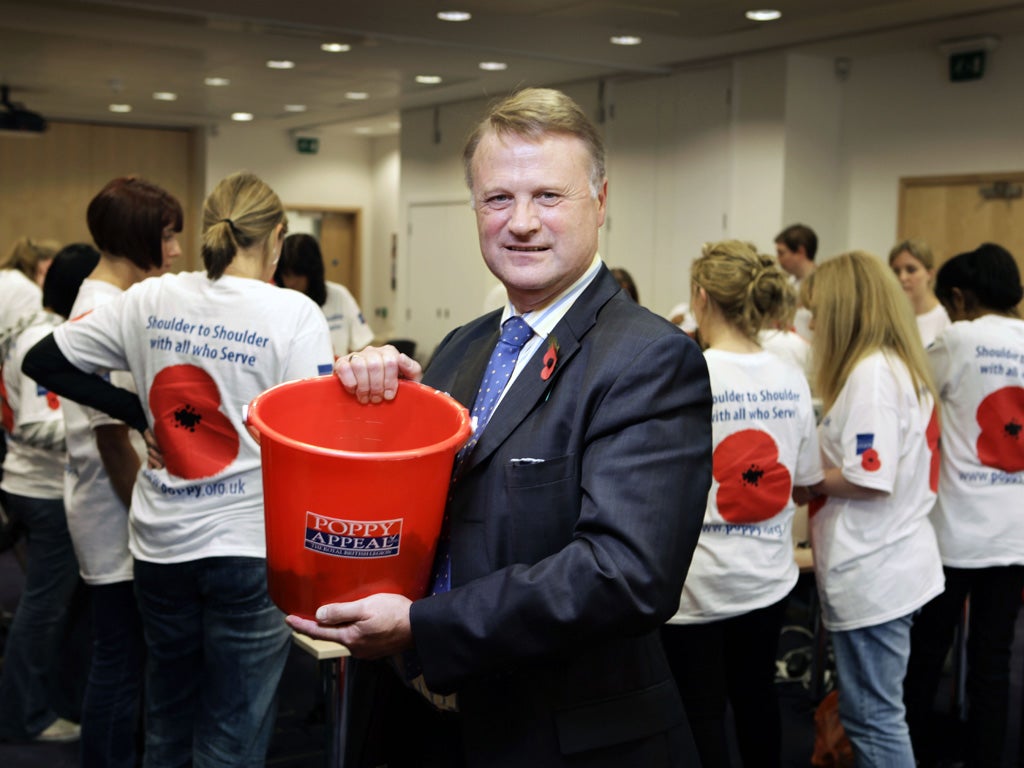British Legion: UK is failing to honour its war dead
Head of military charity hits out at Government's neglect of veterans and their families.

Your support helps us to tell the story
From reproductive rights to climate change to Big Tech, The Independent is on the ground when the story is developing. Whether it's investigating the financials of Elon Musk's pro-Trump PAC or producing our latest documentary, 'The A Word', which shines a light on the American women fighting for reproductive rights, we know how important it is to parse out the facts from the messaging.
At such a critical moment in US history, we need reporters on the ground. Your donation allows us to keep sending journalists to speak to both sides of the story.
The Independent is trusted by Americans across the entire political spectrum. And unlike many other quality news outlets, we choose not to lock Americans out of our reporting and analysis with paywalls. We believe quality journalism should be available to everyone, paid for by those who can afford it.
Your support makes all the difference.Honouring the Military Covenant appears to no longer be a political priority for the Government, the head of the Royal British Legion claimed last night as the body prepares to mark its 90th anniversary as custodian of remembrance for the nation's war dead.
Chris Simpkins, the legion's director general, hit out at ministers who could find the money to re-instate weekly bin collections but not to improve the "disgraceful" treatment of families whose loved ones have died on the front line.
Speaking in the run-up to this week's remembrance events, Mr Simpkins warned of a "tidal wave" of redundancies among forces personnel, some of whom will be invalided out of service. These people will struggle to find work and are at risk of homelessness, marriage breakdown and mental health problems, he said.
He also hit out at "misguided" firms that ban employees from wearing poppies. But Mr Simpkins saved his strongest criticism for the coalition's refusal to appoint an independent chief coroner to improve inquests for fallen soldiers. The role, created by Labour but not filled before the general election, will be scrapped under proposals from Kenneth Clarke, the Justice Secretary. It is claimed the office could cost £10m to set up, and £6.6m a year to run. The Royal British Legion disputes the figures.
"It is about political priorities, because if the Government wanted to do it, they would do it," Mr Simpkins said. "We do think this is a covenant issue. It is about a nation's responsibility. It is key for us. When [the Government] can come up with £250m to persuade local authorities to collect their bins every week ... the Ministry of Justice are saying, 'We haven't got the money in our budget'."
David Cameron, challenged on the issue last week, claimed the money "would be better spent on improving all coroners' services across the country". However, he added: "We are listening very carefully to the concerns expressed."
Earlier this year the legion had to overcome "very considerable resistance, not least from ministers" to have the principles of the Military Covenant enshrined in law, Mr Simpkins said. The future of the chief coroner's office is a major test of that commitment, he insisted.
The legion has already launched an inquest advisory service for forces families. "If you talk to a lot of those people, they are very upset at the treatment they have received." Mr Simpkins complained of a lack of consistency in the way families are treated and a lack of specialist training to give coroners a better understanding of the nature of military deaths. "One coroner dealt with four military inquests in a morning – that is disgraceful."
The legion's income has grown markedly in recent years, up from £86m in 2005-06 to £115m in 2009-10. A third of this is raised during the annual poppy appeal, which attracted controversy again last week when Poundland and Barclays Capital were forced to abandon bans on staff wearing poppies at work. "Let's be clear, wearing a poppy is not a political statement," Mr Simpkins said. "We believe that anybody should be able to wear a poppy with pride."
The legion hopes this year's appeal could raise £40m. However, Mr Simpkins voiced fears that as British troops return from Iraq and Afghanistan, the public "spotlight is already fading", and donations could fall as a result. "The public perception might be to move on to something else, whereas we won't have reached the peak for quite some time." The possibility of cutbacks in coming years "keeps me awake at night".
The legion is committed to helping anyone who has served more than seven days in the forces, as well as their families or dependants, which amounts to nine million people. "We are seeing increased demand for our services. With the cutbacks in the welfare state, more people are finding themselves in financial difficulties," Mr Simpkins said.
And with the MoD due to sack more than 22,000 personnel by 2015, he predicts the problem will get worse. "There is a tidal wave approaching us of people leaving the forces who are going to be looking for work. Even if they are physically unscathed there is the potential for mental wounds which may manifest themselves for some time to come.
"We have never had people surviving the types of injuries they are surviving now. They are going to survive for the next 50, 60, 70, even 80 years, and sooner or later they are going to need a lot of help."
Join our commenting forum
Join thought-provoking conversations, follow other Independent readers and see their replies
Comments